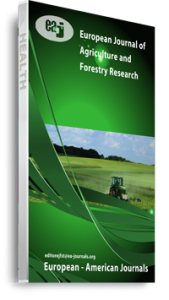The study was conducted to assess the replacement value of cocoa pod husk with soursop pulp meals for napier grass using growth, in vitro gas production characteristics, and nutrient digestibility by West African sheep. Twenty-one (21) growing West African dwarf sheep with an average body weight of 7.00 ± 0.55 were randomly assigned to three (3) dietary treatments with seven (7) animals per treatment in a completely randomized design. The compared dietary treatments were T1 (70% napier grass and 30% concentrate diet which served as the control group), T2 (45% cocoa pod husk with 25% soursop pulp and 30% concentrate diet) and T3 (50% cocoa pod husk with 20% soursop pulp and 30% concentrate diet). The results showed that total feed intake (18.63kg), average daily feed intake (221.79g), feed conversion ratio (8.66), gas production from the insoluble but degradable fraction (42.49ml), potential gas production (44.00ml), methane (8.01ml), metabolisable energy (8.42MJ/kg/DM), organic matter degradability (37.72%) and ether extract digestibility (70%) were significantly (P<0.05) highest in sheep on T1 than T2 and T3. Nitrogen free extract digestibility (75.38%) was significantly (P<0.05) better in sheep on T2 compared with T1 and T3. Final body weight (11.02kg), total body weight (3.66kg), average daily weight gain (43.57g), dry matter digestibility (71.99%), crude protein digestibility (78.93%), crude fibre digestibility (66.89%) and ash digestibility (70.72%) were significantly (P<0.05) highest in T3 than T2 and T1. There were no significant (P>0.05) difference in initial body weight; gas produced from the soluble fraction, gas production rate constant for the insoluble fraction and short chain fatty acids. It is concluded that 50% cocoa pod husk with 20% soursop pulp has the potential to replace 70% napier grass in the practical diet of West African dwarf sheep.
Keywords: Cocoa pod husk, in- vitro gas, performance and sheep, soursop pulp

